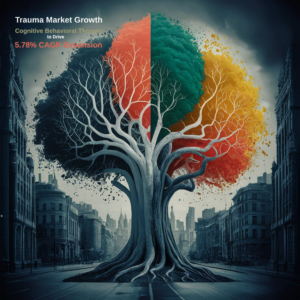Trauma Market Growth: Cognitive Behavioral Therapy to Drive 5.78% CAGR Expansion

The trauma market is poised for significant growth with a projected CAGR of 5.78% over the upcoming period. This growth is fueled primarily by advancements in Cognitive Behavioral Therapy (CBT), which is gaining recognition as an effective treatment for trauma-related conditions.
What is Cognitive Behavioral Therapy?
Cognitive Behavioral Therapy is a form of psychological treatment that addresses maladaptive thinking patterns to influence positive emotional and behavioral change. CBT’s core principle is that by modifying one’s thought processes, it is possible to change feelings and behaviors.
The Role of CBT in Trauma Treatment
CBT has emerged as a breakthrough in treating various forms of trauma, including PTSD, childhood trauma, and other psychological conditions. The efficacy of CBT is supported by numerous clinical studies:
- PTSD Symptoms Reduction: Research shows that CBT can significantly reduce the symptoms of PTSD, offering long-term relief for patients.
- Accurate Identification and Treatment: CBT techniques enable healthcare professionals to identify the root cause of trauma, allowing for tailored treatment approaches.
- Accessibility and Flexibility: There are various modalities of CBT, such as individual therapy, group sessions, and online platforms, making it accessible to a wider population.
Why is the Trauma Market Expanding?
The trauma market’s expansion can be attributed to several key factors:
1. Increased Awareness of Mental Health
In recent years, there has been a significant shift towards recognizing the importance of mental health. This awareness has brought attention to the necessity for effective trauma treatments like CBT.
2. Technological Advancements
The advent of telemedicine and online therapy platforms has made CBT more accessible than ever. These technological innovations facilitate remote treatment, thereby reaching a broader demographic.
3. Government and Organizational Support
Governments and non-profit organizations are increasingly funding mental health initiatives, including research into trauma treatments. These efforts are helping to destigmatize mental health issues and promote therapies like CBT.
4. Evolving Healthcare Policies
With evolving healthcare policies around the world, there is growing support for mental health services. These policies provide coverage for CBT and other forms of therapy, making them more affordable for the general public.
Market Analysis: The Numbers Speak for Themselves
According to market research, the trauma market is expected to experience a CAGR of 5.78% over the forecast period. This promising growth highlights the increasing demand for effective trauma treatments:
- North America: Expected to hold a significant share due to advanced healthcare infrastructure and high awareness levels.
- Europe: Gains traction supported by favorable healthcare policies and public health initiatives.
- Asia-Pacific: Emerging market with increasing awareness and growing healthcare investments.
Challenges and Opportunities
While the outlook is positive, the trauma market still faces certain challenges that need to be addressed:
Challenges
- Stigma: Despite advancements, mental health stigma remains a barrier to treatment-seeking behavior.
- Access to Care: In many regions, access to qualified mental health professionals is limited.
Opportunities
- Teletherapy: The rise of teletherapy offers an opportunity to bridge the gap in access to care.
- Innovative Therapies: Continuous research into innovative CBT techniques and other therapies will further enhance treatment efficacy.
The Future of CBT in the Trauma Market
As we look ahead, the future of Cognitive Behavioral Therapy within the trauma market appears promising:
- Artificial Intelligence: AI is being integrated into CBT to create personalized treatment plans.
- VR Therapy: Virtual Reality is another emerging field that could revolutionize CBT by offering immersive treatment environments.
The continuous development and adoption of CBT and other innovative therapies will undoubtedly drive further growth in the trauma market, providing much-needed relief to those affected by trauma.